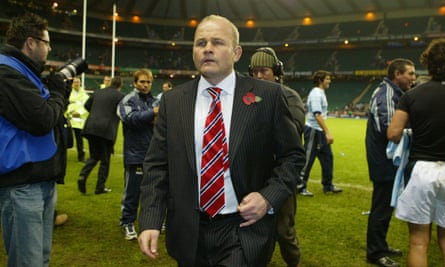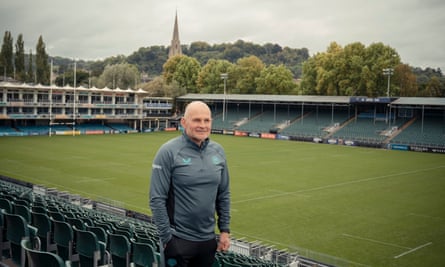Few individuals, if any, are better qualified to discuss the ebb and flow of high-level coaching than Andy Robinson. Twenty years ago this month he was promoted to be England’s head coach with a World Cup medal and an OBE tucked away. If the subsequent two decades have reinforced anything it is that sport is about timing and resilience as much as milk and honey.
The man sitting across a cafe table in downtown Bath has been appointed to – and removed from – three head coaching jobs in international rugby in Europe, with England, Scotland and Romania. He has also been a Premiership general at two illustrious clubs, Bath and Bristol, without losing any of his enthusiasm for the battle. Even at the age of 60, sipping a black coffee, his deep-set eyes are gleaming. Ahead of Saturday’s West Country derby – 136 years of intense rivalry and counting – he has just remembered he never lost a league or cup game against Bristol as a player or head coach.
It gives him a unique insight into how the professional game has changed and, in some respects, stayed the same. These days he is contact coach and head of the academy at Bath where, in what must now feel like another lifetime, he was once a key cog in the club’s trophy-laden heyday. How intriguing, then, that he sees similarities between the fabled Bath sides of yesteryear and their present-day successors.
Specifically, he detects the fierce competitive edge that used to be Bath’s calling card. When he arrived at Bath as a 20-year-old, Robinson had one mission: to make the first team ahead of the club captain and incumbent openside flanker Roger Spurrell – “I wasn’t as tough as Roger …” – by any means possible. “That’s what I’m seeing now: when you get your chance you take it. That’s what we had. If you had one or two bad games you were gone.”
There is plenty more street wisdom that “Robbo” – capped eight times by England, a British Lion in 1989 and one of rugby’s rare vegetarians – can pass on to younger coaches and players alike. As well as honing a world-beating pack that helped deliver Sir Clive Woodward a knighthood, this is a coach who once steered Scotland past Ireland at Croke Park, was instrumental in bringing Andy Farrell into English union and signed the current England head coach, Steve Borthwick, as a little-known 18-year-old.

Where to start? Inevitably there can be no sidestepping his dismissal from the England job in November 2006, which still stings. “The worst one for me was the England one,” he confirms, reflecting on a few of the costly super-slim margins that precipitated it. “We gave Gavin Henson the chance to kick that penalty in the 75th minute [in Cardiff in 2005], then lost narrowly to France having played some great rugby [England missed six kicks at goal].
“My final game in charge of England was against South Africa. We’d beaten them the previous week. Ten minutes before half-time we’re 12-3 up but at half-time we were 15-12 down. For me we were in a position to win all those games.”
Might it all have played out differently with a touch more luck? Robinson’s chosen captain, Jonny Wilkinson, was injured and never played a Test under him. A fourth autumn Test against New Zealand was shoehorned into the 2006 schedule despite his protestations to the Rugby Football Union’s chief executive, Francis Baron. The subsequent home defeat by Argentina duly proved pivotal. “They were full of quality players but obviously the headline is ‘England lose at home to Argentina’. And South Africa went on to win the World Cup; I think we were the last side to beat them. But it’s about winning or losing. If you lose you give away your ability to control the narrative. And that’s effectively what happened. Yes, there’s been a high-profile sacking or two but it’s small margins.”
There were some equally agonising Sliding Doors moments in Scotland, where Robinson was head coach between 2009 and 2012. “It’s a great rugby nation. There are great people there … I really enjoyed their passion. We beat Australia for the first time since 1982, then lost 9-6 to Argentina the following week. Against Wales in Cardiff in 2010 we were clearly the best side for 75 minutes – then we imploded.” More recently in Romania – “My wife, Sam, supported it because she saw the passion was still there” – there was still little respite. “In 2021 we were drawing 17-17 with Argentina in the 70th minute. We lost 24-17 but on the last play we’re on their line and the referee gives a penalty against our scrum-half for encroaching. It could have been a fabulous draw.”
after newsletter promotion

So near and yet so far. And, on occasions, things are simply not meant to be. “At Scotland I agreed with the CEO it was the right time to go. I was disappointed about Bristol but I could understand it given we’d lost our first seven league games of the season.”
All that accumulated knowledge, though, explains why the seen-it-all Robinson is of such value to Bath now and why Borthwick’s England may do well to consult him. “You’ve got to create the right culture but then it’s about winning,” says Robinson, now on his second cup of coffee and warming to his theme. “When I look at the time Steve now has with the players … that was what we were fighting for. It was one of the reasons Clive left. But the RFU were in litigation with PRL … it was never going to work. In 2006 we won our first two Six Nations games then the players all went off to play for their clubs in the fallow week. The following weekend we went up to Scotland and lost by a score. You look at it now and go: ‘That’s what we deserved.’”
At least he enjoyed some belated revenge as Scotland’s coach. The 2010 Calcutta Cup game ended in a 15-15 draw and afterwards, out of view of the Murrayfield cameras, he could not resist giving the aforementioned Baron a hefty dig in the ribs. For the most part, though, the grandfather-of-three now feels “very lucky” on assorted fronts and retains a sharp sense of perspective. “My father got ill with multiple sclerosis when I was 13. Enjoy the moment because life’s too short. You can’t deal with ‘if onlys’.” If you bump into “Robbo” at the Rec on Saturday you will find a grateful rugby man at peace with the world.
